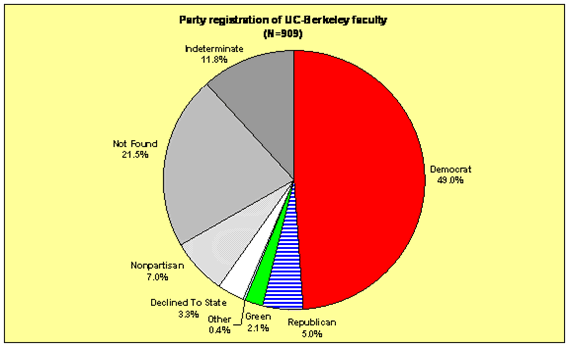Welcome
to the
Langbert, Quain, and Klein study (2016): Abstract: We investigate the voter registration of faculty at 40 leading U.S. universities in the fields of Economics, History, Journalism/Communications, Law, and Psychology. We looked up 7,243 professors and found 3,623 to be registered Democratic and 314 Republican, for an overall D:R ratio of 11.5:1. The D:R ratios for the five fields were: Economics 4.5:1, History 33.5:1, Journalism/Communications 20.0:1, Law 8.6:1, and Psychology 17.4:1. The results indicate that D:R ratios have increased since 2004, and the age profile suggests that in the future they will be even higher. We provide a breakdown by department at each university. The data support the established finding that D:R ratios are highest at the apex of disciplinary pyramids, that is, at the most prestigious departments. We also examine how D:R ratios vary by gender and by region. People interested in ideological diversity or concerned about the errors of leftist outlooks—including students, parents, donors, and taxpayers—might find our results deeply troubling.
Cardiff and Klein study: The following Cardiff and Klein article appearing in Critical Reivew is the latest on voter-registration investigations of faculty partisanship. (It pretty much subsumes the Klein and Western study of Berkeley and Stanford.) Christopher F. Cardiff and Daniel B. Klein: Faculty Partisan
Affiliation in All Disciplines: A Voter-Registration Study Link to master Excel file (names redacted, with correction noted immediately above) Abstract of Cardiff and Klein: The
party registration of tenure-track faculty at 11 California universities,
ranging from small, private, religious-affiliated institutions
to large, public, elite schools, shows that the “one-party campus” conjecture
does not extend to all institutions or all departments. At
one end of the scale, U.C. Berkeley has an adjusted Democrat:Republican
ratio of almost 9.1, while Pepperdine University has a ratio of nearly
1:1. Academic discipline also makes a tremendous difference,
with the humanities averaging a 10:1 D:R ratio and business schools
averaging 1.3:1, and with departments ranging from sociology (44:1)
to management (1.5:1). Across all departments and institutions,
the D:R ratio is 5:1, while, in the “soft” liberal-arts
fields, the ratio is higher than 8:1. These results are generally
in line with previous studies. - - - - In the same issue, Critical Review published the latest, greatest article on the Klein-Stern policy-views/voting survey of six scholarly disciplines. It is here. - - - - Here is material on Klein-Western, which, again, really is superceded by Cardiff-Klein: (Link to pdf below)
Links to materials: Pdf link to the complete academic working paper, to appear in Academic Questions: How
Many Democrats per Republican at UC-Berkeley and Stanford? Voter
Registration Data across 23 Academic Departments Related work by Daniel Klein and coauthors: Professors and Their Politics: The Policy Views of Social Scientists by Daniel B. Klein and Charlotta Stern, Critical Review. Sociology and Classical Liberalism by Daniel B. Klein and Charlotta Stern, The Independent Review How
Politically Diverse Are the Social Sciences and Humanities? Survey
Evidence from Six Fields Groupthink in Academia: Majoritarian Departmental Politics and the Professional Pyramid -- This piece adapts groupthink theory to the setting of academia. Focusing especially on the micro mechanism of majoritarian departmental politics and the more macro cultural mechanism of the disciplinary pyramid, it offers a theory of how a bad worldview, once it reached a tipping point, could tend toward domination of the academic discipline and get locked-in. It was written for the 2009 AEI volume The Politically Correct University and reprinted in The Independent Review. By the Numbers: The Ideological Profile of Professors, in the 2009 AEI volume The Politically Correct University. The paper reviews all the data up to 2008 about professoriate ideology. Is There A Free-Market Economist in the House? The Policy Views of American Economic Association Members, American Journal of Economics and Sociology, 2007. Embarrassed as a Non-Left Professor? Society, 2010. The Social Science Citation Index: A Black Box—with an Ideological Bias? Institutional Ties of Journal of Development Economics Authors and Editors The PhD Circle in Academic Economics Sense and Sensibilities: Myrdal's Plea for Self-Disclosure and Some Disclosures about AEA Members by Daniel B. Klein, Econ Journal Watch, 2006. Long reply to Zipp and Fenwick's POQ article, Society 2008. Review of Rothman, Woessner, and Kelly-Woessner book.
Daniel Klein’s Personal Homepage |
